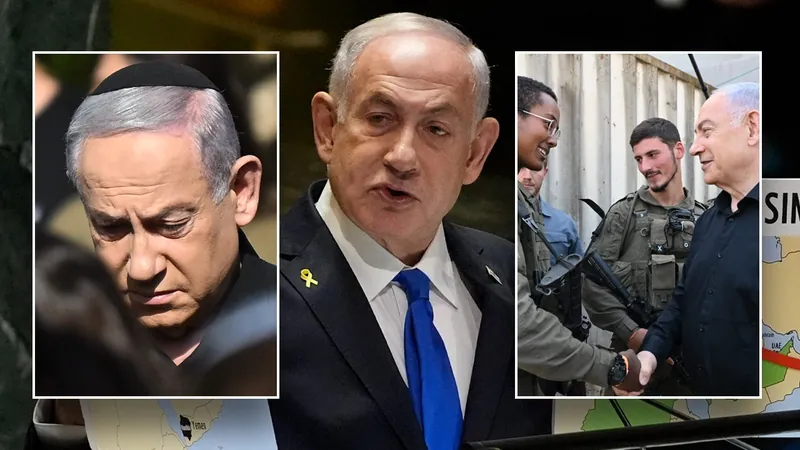
Netanyahu's Churchillian Resolve: Navigating a Multifront War Against Iranian-Backed Terrorism
2024-10-07
Author: Chun
Netanyahu's Churchillian Resolve: Navigating a Multifront War Against Iranian-Backed Terrorism
**JERUSALEM** – A year ago, Israel Prime Minister Benjamin Netanyahu faced one of the most harrowing moments in the nation's history, as Hamas launched a devastating attack on October 7, 2023. The coordinated assault, executed by an estimated 3,800 armed militants out of 6,000 total participants, resulted in the bloodiest day for the Jewish state since the Holocaust, with approximately 1,200 lives lost, including over 30 American citizens.
The brutality inflicted on that day shocked the world, with acts of violence that included beheadings and the burning of bodies, marking a horrifying escalation by the Iranian-supported group. Additionally, Hamas took more than 250 hostages, intensifying the crisis that continues to ripple through Israeli society, with 101 hostages still unaccounted for as of now.
In the wake of this unprecedented assault, Netanyahu's leadership has been scrutinized, yet experts see a transformation in his approach as he leads Israel into an intensive conflict involving multiple fronts against the Islamic Republic of Iran’s network of allies. According to Ariel Kahana, a senior diplomatic correspondent, Netanyahu's agility and resolve were immediately evident as he communicated to the nation, stating, “Citizens of Israel, we are at war...” This unequivocal stance galvanized both military and public responses to the threat.
Israeli Ambassador to the U.N., Danny Danon, highlighted Netanyahu’s strategic successes, detailing significant operations that dismantled Hamas’s tunnel networks and neutralized key figures within Hezbollah, Israel's northern adversary. Despite the progress, challenges remain, such as the ongoing plight of hostages and the displacement of approximately 70,000 Israelis who have fled their homes.
The year leading up to the attack saw Netanyahu grappling with political unrest, facing large public protests against his judicial reform plans. However, the events of October 7 have solidified his position, with increasing support reflected in political polls. As military operations escalated, key victories have followed, including targeting senior leadership in Hezbollah. This military momentum has reignited discussions around Netanyahu’s effectiveness, with some likening him to Winston Churchill during WWII, enforcing a decisive narrative despite internal government hesitations.
Israeli Defense Forces (IDF) operations in southern Lebanon and the Gaza Strip have been particularly impactful, leading to significant losses for terror groups. The successful offensive in Rafah, where thousands of militants were eliminated, was marked by political friction within Netanyahu's own coalition, as some military leaders hesitated in their responses to his orders.
Despite Israel’s military achievements, Netanyahu faces criticism from various corners. Detractors argue that he lacks a coherent strategy to secure an exit from the current conflict or address the lingering hostage crisis. Veteran political commentators have accused him of prioritizing personal and political survival over comprehensive conflict resolution.
In stark contrast, former advisers defend Netanyahu’s unwavering position against international pressure from the Biden administration, arguing that his resolve has allowed Israel to remain strong amid ongoing threats. Critiques regarding hostility towards U.S. relations have emerged, yet supporters assert that such a stance preserves Israel’s sovereignty.
As this multifaceted war unfolds, Netanyahu’s leadership will continue to be shaped by evolving challenges on the battlefield and the political landscape within Israel. The outcomes of current military engagements, the fates of hostages, and Netanyahu's enduring commitment to Israel's safety will ultimately determine whether he solidifies a legacy like that of Churchill or faces reckoning from an increasingly divided electorate.
In this high-stakes environment, one question persists: will Netanyahu’s determined leadership lead to a secure and stable Israel, or will the internal criticisms and geopolitical challenges undermine his authority and strategy? The world watches closely, as the stakes have never been higher for the nation and its leadership.


 Brasil (PT)
Brasil (PT)
 Canada (EN)
Canada (EN)
 Chile (ES)
Chile (ES)
 España (ES)
España (ES)
 France (FR)
France (FR)
 Hong Kong (EN)
Hong Kong (EN)
 Italia (IT)
Italia (IT)
 日本 (JA)
日本 (JA)
 Magyarország (HU)
Magyarország (HU)
 Norge (NO)
Norge (NO)
 Polska (PL)
Polska (PL)
 Schweiz (DE)
Schweiz (DE)
 Singapore (EN)
Singapore (EN)
 Sverige (SV)
Sverige (SV)
 Suomi (FI)
Suomi (FI)
 Türkiye (TR)
Türkiye (TR)